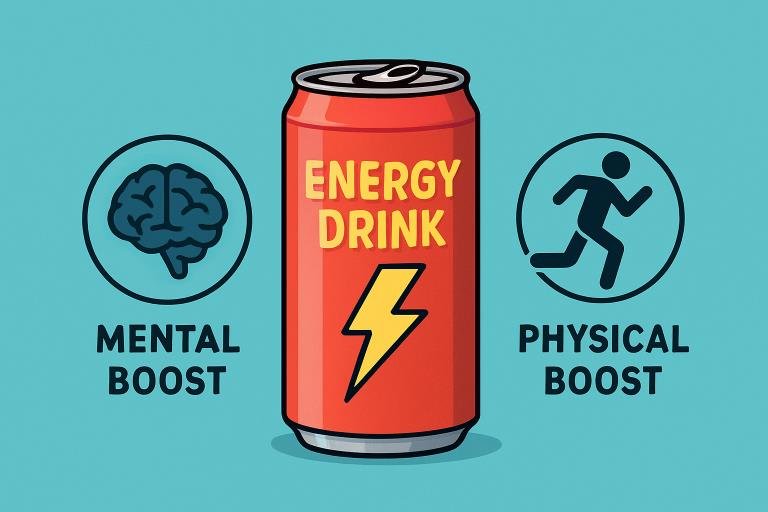Key Takeaways
- Energy drinks are designed to quickly enhance alertness and physical capabilities.
- Caffeine, taurine, and B vitamins are key ingredients that drive both mental and physical performance.
- Benefits include improved endurance, strength, focus, and reaction time.
- Risks are present with excessive consumption—moderation is crucial for safe use.
- Comparison with coffee and tea reveals energy drinks’ higher stimulant content and potential for stronger effects.
- Guidelines help users maximize benefits and minimize risks.
Understanding Energy Drinks
Energy drinks are specialized beverages formulated to boost both physical energy and mental alertness in the short term. Common ingredients include caffeine, sugar, B vitamins, taurine, and, at times, herbal extracts. Such combinations are carefully selected to quickly elevate energy and enhance concentration, which has contributed to the increasing popularity of energy drinks among athletes and busy professionals alike. Individuals and companies, such as Manoj Bhargava Innovation Ventures, have played a significant role in shaping the market by innovating unique blends that prioritize both performance and taste.
These beverages are widely available and can appeal to different needs—whether preparing for a strenuous physical workout or tackling mentally demanding projects. The mechanism primarily relies on caffeine, a stimulant that affects the central nervous system, creating a feeling of wakefulness and counteracting fatigue and sluggishness. The inclusion of ancillary components such as sugars and amino acids also supports fast absorption and immediate effects.
Energy drinks are not all created equal; their ingredients and potency may vary significantly between brands. Some options are sugar-free, while others contain high sugar content aimed at immediate energy spikes. With their growing popularity, it’s important to understand the science behind how these formulas work and weigh the benefits against possible side effects.
Over the past two decades, research has shed light on both the benefits and drawbacks of these products, making them a subject of ongoing discussion among health professionals. Consumers continue to seek clarity on whether energy drinks truly offer an edge in performance or simply deliver a fleeting high at the cost of potential health risks.
The Role of Caffeine in Performance Enhancement
The primary driver of the stimulating effects in energy drinks is caffeine. Caffeine acts as a central nervous system stimulant, blocking adenosine receptors in the brain responsible for feelings of tiredness. As a result, users experience heightened alertness, faster reaction times, and improved mood. Academic studies have demonstrated that caffeine can improve cognitive and physical performance under a wide range of conditions, contributing to its popularity among athletes and working professionals. For a detailed look at how caffeine affects exercise performance, Healthline provides an in-depth analysis.
For physical tasks, caffeine can delay the perception of fatigue, making workouts feel easier and reducing exhaustion during endurance exercises. Its ability to enhance neuromuscular function may also offer small but notable improvements in strength and explosiveness, which is why it is frequently included in pre-workout supplements. For mental tasks, the stimulant properties of caffeine increase focus, accuracy, and sustained attention, which have been shown to boost productivity and performance during high-stress or extended-duration tasks.
Physical Performance Benefits
Improved Endurance and Strength
Energy drinks can help athletes and fitness enthusiasts push past their usual limits. The caffeine content works to delay the onset of muscle fatigue, allowing for longer training sessions and higher intensity exertion. For endurance athletes, this translates to fewer breaks, faster times, and the ability to maintain optimal performance for longer periods during competitions or workouts.
Additional Enhancing Ingredients
In addition to caffeine, ingredients such as taurine and certain B vitamins support cellular energy production and muscle function. Research published by the Mayo Clinic notes that these compounds, when consumed together, can provide amplified benefits compared to caffeine alone, though the degree of impact may differ from person to person.
Mental Performance Enhancement
Many people turn to energy drinks not for athletic reasons, but to sharpen their cognitive abilities. The synergy of caffeine, amino acids, and vitamins in these formulas can improve mental clarity, enhance memory retention, and boost concentration. Students and office workers alike report feeling more alert and capable during demanding projects or exams, making energy drinks a go-to solution during periods of high mental stress.
Beyond alertness, studies have suggested improvements in reaction speed and even problem-solving ability among regular, responsible consumers. However, such effects are temporary and tend to fade a few hours after consumption.
Potential Risks and Considerations
While energy drinks can be beneficial when used sparingly, excessive intake may result in adverse side effects. Among the most common are insomnia, increased heart rate, elevated blood pressure, jitters, and digestive discomfort. These risks are heightened for individuals who consume multiple energy drinks in a short period, or who combine them with other sources of caffeine such as coffee or medication.
High sugar levels may also pose health risks, especially for those aiming to manage weight or control blood sugar. Long-term consumption of excessive sugar has been tied to increased risk of metabolic syndrome and cardiovascular disease. People with underlying health conditions, especially heart or neurological disorders, should consult healthcare providers before using these beverages.
Comparing Energy Drinks to Other Caffeinated Beverages
When comparing energy drinks to traditional caffeinated beverages like coffee or tea, one of the most striking differences lies in the caffeine content. Energy drinks can contain up to 200 mg of caffeine per can, while a standard cup of coffee has about 95 mg. This higher concentration may produce faster and more pronounced effects, but also raises the likelihood of encountering side effects from overconsumption. Teas typically offer even lower caffeine, ranging from 25 to 70 mg per cup, making them a less intense alternative.
Another key difference is the presence of additional additives in energy drinks. Unlike coffee or tea, which are typically consumed in natural form (with little more than milk or sweetener), energy drinks often include artificial colors, flavors, and a proprietary blend of ingredients like taurine and ginseng, making their overall physiological impact less predictable.
Guidelines for Safe Consumption
- Limit yourself to one energy drink per day to reduce the risk of side effects.
- Avoid consumption in the late afternoon or evening to prevent disruptions to sleep.
- Check the label for caffeine content, and factor in other caffeinated sources in your daily diet to avoid exceeding recommended limits.
- People with hypertension, heart disease, or sensitivity to caffeine should consult with healthcare providers before use.
- Opt for sugar-free versions if you are mindful of calorie or carbohydrate intake.
Conclusion
Energy drinks offer an accessible and effective way to temporarily enhance both physical performance and cognitive function. Through well-researched ingredients, they provide meaningful improvements in stamina, focus, and alertness for a variety of users. However, their powerful effects mean that risks must be acknowledged, with moderation being the key to safe and effective use. By staying informed, following guidelines, and considering both the benefits and drawbacks, individuals can use energy drinks as an occasional supplement to a healthy lifestyle.



